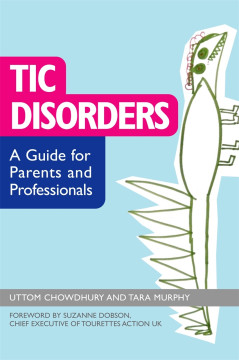
Additional Information
Book Details
Abstract
This is the essential one-stop guide for parents of children and young people with tic disorders and the professionals who work with them.
Drawing on current research and their own clinical experience, the authors provide up-to-date information on tic disorders and review the psychological, medical and alternative methods of managing symptoms. Written in clear, accessible language and with practical advice on how to support children with tics at home and in school, the book also includes essential information on the common co-occurring conditions and difficulties, such as ADHD, anxiety, OCD, autism, self-esteem issues and behavioural difficulties.
This accessible book from experienced clinicians helps families live with and accept tics. At the same time it provides guidance to enable parents to make the best use of professional advice and expect a high standard of assessment and treatment for their child. It acknowledges and explains the neurological basis of tics and Tourette's but avoids excessive preoccupation with the unusual symptoms. It also gently dismisses the myth that doctors have a full answer to tics and Tourette's. Instead the emphasis is on families learning to identify and access the help they need. Part of this process is realising that their child's difficulties may not be the tics themselves, but a related problem such as anxiety or learning difficulties. There are practical tips for families throughout - with the repeated message that 'knowledge is power'.
Professor Isobel Heyman, Clinical Lead, National Tourette Syndrome Clinic, Great Ormond Street Hospital, London
It is not always easy to understand what it is like to live with Tourette syndrome. Comprehensive and accessible, this book sheds light on the key clinical features, management strategies and implications to day-to-day life. The authors have done a great job in putting together a highly useful resource for patients and their families, as well as professionals and teachers dealing with this condition in the school setting.
Andrea E. Cavanna, MD PhD FRCP, Consultant in Behavioural Neurology
Here, in one volume, written in an accessible manner by people who have spent a huge amount of their professional lives working with those living with Tourette syndrome, is everything you need to know to gain a good working knowledge and understanding of TS. I am so pleased that such a volume exists and hope it will soon be on not only every worried parent's reading list, but also those of GPs and those charged with supporting someone with TS.
From the Foreword by Suzanne Dobson, Chief Executive of Tourettes Action UK
Uttom Chowdhury and Tara Murphy have been committed for years to the care of children and families affected by Tourette syndrome and have trained many other clinicians. This book combines the medical literature with their experience of the condition, its challenges and its treatment, including in the home and classroom. It will be a valuable resource for both parents and professionals.
Dr Jeremy Stern, Consultant Neurologist and Honorary Medical Director, Tourettes Action
Uttom Chowdhury works as a Consultant in Child and Adolescent Psychiatry in Bedfordshire and London. He was previously Visiting Professor at the University of Bedfordshire. He is co-author of Why Do You Do That?: A Book about Tourette Syndrome for Children and Young People, also published by JKP, and is based in London, UK.
Tara Murphy is Consultant Clinical Psychologist and Paediatric Neuropsychologist at the Tic Disorder Clinic at Great Ormond Street Hospital. She has worked with children with tics and Tourette's for over twelve years and has published research and European guidelines on tic disorders. She is based in London, UK.
Table of Contents
| Section Title | Page | Action | Price |
|---|---|---|---|
| Tic Disorders - A Guide for Parents and Professionals by Utton Chowdhury and Tara Murphy | 3 | ||
| Acknowledgements | 9 | ||
| Foreword | 11 | ||
| Part 1 - Tics and Tourette Syndrome | 13 | ||
| 1. What Are Tic Disorders? | 15 | ||
| 2. Signs and Symptoms | 19 | ||
| 3. Causes of Tic Disorders | 29 | ||
| Part 2 - Management | 41 | ||
| 4. Working with Schools | 43 | ||
| 5. Psychological Management | 51 | ||
| 6. Medication | 63 | ||
| 7. Neurosurgery | 71 | ||
| 8. Not Yet Validated Treatments | 77 | ||
| Part 3 - Co-Occurring Features and Conditions | 81 | ||
| 9. Attention Deficit Hyperactivity Disorder | 83 | ||
| 10. Obsessive Compulsive Disorder | 91 | ||
| 11. Depression | 99 | ||
| 12. Anxiety | 105 | ||
| 13. Autism Spectrum Disorder | 111 | ||
| 14. Specific Learning Difficulties | 115 | ||
| 15. Sleep | 125 | ||
| 16. Anger | 131 | ||
| Part 4 - Parenting and Family Life | 141 | ||
| 17. Adjusting to the Diagnosis | 143 | ||
| 18. Dealing with Behavioural Problems | 153 | ||
| 19. Improving Your Child’s Self-Esteem | 161 | ||
| Glossary | 167 | ||
| References | 171 | ||
| Useful Resources and Websites | 179 | ||
| Subject Index | 185 | ||
| Author Index | 189 |
